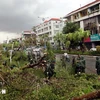Only one-third of the 35,000 small slaughterhouses in the country are under local authorities' control, it was reported at a recent seminar.
The chaotic situation has caused serious problems related to food hygiene and safety, speakers said at the two-day event in HCM City in mid-May on livestock and poultry transport and slaughter.
"State management of livestock and poultry transport and slaughterhouses cannot meet demand," Pham Van Dong, head of the Ministry of Agriculture and Rural Development's Veterinary Department, said in the opening speech of the seminar.
All 63 provinces have set up industrial slaughterhouses and 53 of a total of 63 provinces have received approval for their master plan for industrial slaughterhouses.
But small non-mechanised slaughterhouses continue to be set up because of the demands of the market.
"Slaughterhouse owners do not have the correct awareness about veterinary hygiene and food safety as well as social responsibility. They only work for profit and refuse to bring livestock and poultry into industrial slaughterhouses," Huynh Thi Thanh Binh, deputy head of the department's Community Veterinary Division, said.
She said that only 29,000 veterinary staff are employed in the country.
"There is not enough staff to manage small non-mechanised slaughterhouses. In addition, fees for slaughterhouse inspections are too low, and as a result, are not enough to pay salary for staff," she added.
Binh suggested that a temporary regulation on managing veterinary hygiene for small slaughterhouses should be created.
In 2014, six provincial veterinary sub-departments handed out fines to violators involved in 31 cases that had injected water into livestock. Fines totalled 255 million VND (12,000 USD).
To improve the situation, the six-year Livestock Competitiveness and Food Safety Project (Lifsap) was launched in 2010 co-funded by World Bank and the Vietnamese Government.
Its aim is to increase competitiveness of household-based livestock producers, to reduce the environmental impact of livestock production, processing and marketing, and to improve food safety in livestock product supply chains (mainly meat) in selected provinces.
The project will contribute to achieving the higher-level objective of improving the over-all competitiveness of domestic livestock production.
It also aims to increase production efficiency through the adoption of Good Animal Husbandry Practices (GAHP) and reduction of negative environmental impact. By having participating livestock producers, markets and slaughterhouses meet established environmental standards.-VNA
The chaotic situation has caused serious problems related to food hygiene and safety, speakers said at the two-day event in HCM City in mid-May on livestock and poultry transport and slaughter.
"State management of livestock and poultry transport and slaughterhouses cannot meet demand," Pham Van Dong, head of the Ministry of Agriculture and Rural Development's Veterinary Department, said in the opening speech of the seminar.
All 63 provinces have set up industrial slaughterhouses and 53 of a total of 63 provinces have received approval for their master plan for industrial slaughterhouses.
But small non-mechanised slaughterhouses continue to be set up because of the demands of the market.
"Slaughterhouse owners do not have the correct awareness about veterinary hygiene and food safety as well as social responsibility. They only work for profit and refuse to bring livestock and poultry into industrial slaughterhouses," Huynh Thi Thanh Binh, deputy head of the department's Community Veterinary Division, said.
She said that only 29,000 veterinary staff are employed in the country.
"There is not enough staff to manage small non-mechanised slaughterhouses. In addition, fees for slaughterhouse inspections are too low, and as a result, are not enough to pay salary for staff," she added.
Binh suggested that a temporary regulation on managing veterinary hygiene for small slaughterhouses should be created.
In 2014, six provincial veterinary sub-departments handed out fines to violators involved in 31 cases that had injected water into livestock. Fines totalled 255 million VND (12,000 USD).
To improve the situation, the six-year Livestock Competitiveness and Food Safety Project (Lifsap) was launched in 2010 co-funded by World Bank and the Vietnamese Government.
Its aim is to increase competitiveness of household-based livestock producers, to reduce the environmental impact of livestock production, processing and marketing, and to improve food safety in livestock product supply chains (mainly meat) in selected provinces.
The project will contribute to achieving the higher-level objective of improving the over-all competitiveness of domestic livestock production.
It also aims to increase production efficiency through the adoption of Good Animal Husbandry Practices (GAHP) and reduction of negative environmental impact. By having participating livestock producers, markets and slaughterhouses meet established environmental standards.-VNA



















